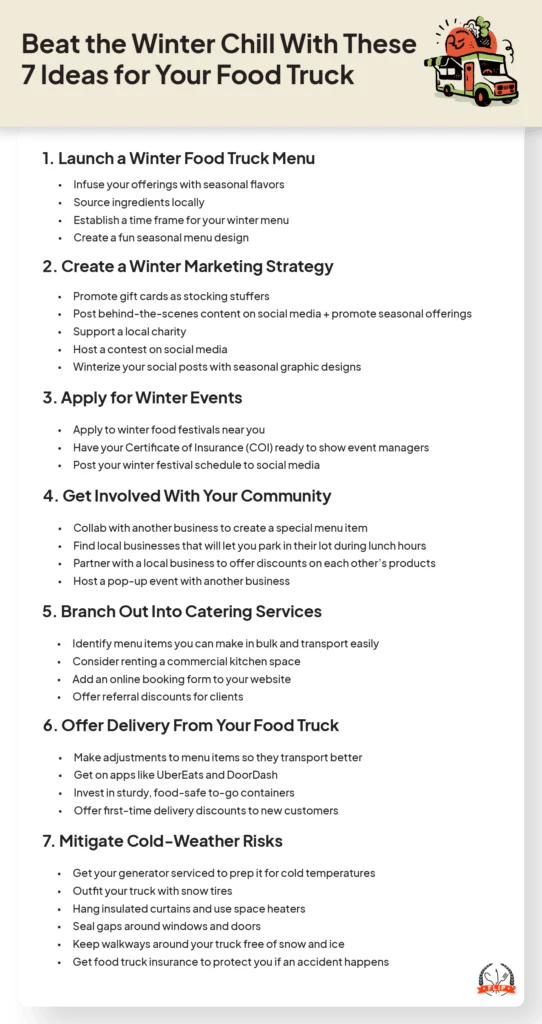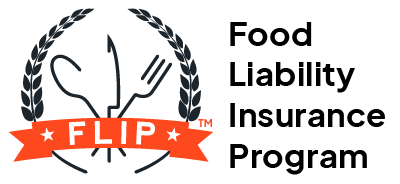Last Updated: January 24, 2025 by Alex Hastings
If you feel anxious about what winter means for your food truck business, you aren’t alone. Operating outdoors is more of a challenge when the temperatures dip, as snow and ice make it difficult for customers to seek out street food.
Here are seven winter business ideas you can work into your food truck strategy to maintain steady earnings and retain customers, no matter the weather.

1. Launch a Winter Food Truck Menu
Humans might be creatures of habit, but we also have an appetite for new things. In fact, 59% of people are more likely to purchase a seasonal menu item than a normal one!
How to Do This:
- Identify seasonal winter flavors to work into your usual offerings (e.g., a horchata-flavored donut or a butternut squash pizza)
- Source ingredients locally when possible for maximum freshness
- Decide on the time period when you’ll offer your winter menu, such as December through February
- Create a separate, seasonal design for the menu (you can do this easily with free Canva templates you can customize for your business)
2. Create a Winter Marketing Strategy
Marketing your food truck effectively is always important. But you may need to adjust your strategy in the winter to attract customers when there isn’t as much foot traffic.
All of your marketing and messaging should embrace the season rather than fight it. You can attract more customers if you make winter a fun and exciting time for your business!
How to Do This:
- Promote your gift cards as the perfect stocking stuffers or addition to a gift basket (bonus points if they have a festive design!)
- Post pictures and videos to Facebook, Instagram, TikTok, and your other socials to give behind-the-scenes looks at your business or your seasonal offerings (like this TikTok from Truck of Treats)
- Pick a local charity to support, get the word out to your customers via social media, and donate a small percentage of your profits to them on a specific day
- Engage customers with a social media photo contest (like customers taking a picture of something they purchased from your winter menu) where they tag your business in the photo for the chance to win a prize
- Use tools like free Canva templates to winterize your social media posts and catch peoples’ attention with fun, festive colors
3. Apply for Winter Events (Sunshine or Snow!)
If you have harsh winters, a lot of markets and food events in your area probably happen in the spring and summer. But even northern states like Washington and New York host winter markets and events you can participate in, no matter the weather!
Winter and year-round markets are an excellent way to retain customers and reach new ones, whether you do business in a warm or cold climate.
How to Do This:
- Find a food festival near you and learn how to apply by visiting their website
- Have your Certificate of Insurance (COI) ready when event organizers ask for proof of coverage
- Let customers know where they can find you by posting about which events you’ll be taking part in on your social media channels and your website
- Stock up on all the essentials for winter market vending
4. Get Involved With Your Community
Partnering with local businesses is a mutually beneficial way to keep your business thriving in the winter. Not only do you gain exposure to each other’s customers — you can also help support one another through the season’s challenges.
How to Do This:
- Collaborate on a specialty offering that highlights both business’ products (e.g., a coffee food truck partnering with a cupcake food truck on a holiday dessert bundle)
- Reach out to local businesses who might also be looking to boost food traffic and offer to park your truck there during lunch or on a weekend
- Partner with a local business to offer discounts or coupons on each other’s products with each purchase
- Host a pop-up event with another business featuring exclusive seasonal offerings
5. Branch Out Into Catering Services
Colder weather moves some events indoors until things warm up again, which can pose a challenge for your food truck business. That’s why, at least in the winter, food trucks can benefit from offering catering services.
How to Do This:
- Figure out which menu items you can make in large quantities and are easy to transport
- Consider renting a commercial kitchen where you can prep dishes if your truck’s kitchen can’t accommodate large volumes of food
- Add an online booking form to your website where customers can request quotes and reserve dates
- Promote your new catering service on social media and customer emails
- Offer referral discounts for clients who recommend you to friends and loved ones
6. Offer Delivery From Your Food Truck in the Winter
Some folks are less likely to leave their homes when the weather is bad, especially if snow and ice make it hard to do so. Instead of asking customers to brave the elements, meet them where they are with seasonal delivery!
How to Do This:
- Identify which menu items hold up the best during transport (or make adjustments to best sellers as needed so food quality isn’t sacrificed)
- Partner with apps like UberEats and DoorDash to facilitate smooth deliveries
- Invest in sturdy, food-safe to-go containers that keep your dishes intact and control for temperature during transit
- Share the news on social media and email newsletters
- Offer first-time delivery discounts to entice customers
7. Mitigate Cold-Weather Risks
One of the best winter food truck ideas (though also the easiest to overlook) is going all-in on risk mitigation.
Harsh weather conditions can make things a little more dangerous for you and your customers. Not to mention how much harder your appliances work when it’s cold out.
How to Do This:
- Make sure your food truck generator can handle the stress of colder temperatures by getting it serviced before the season starts
- Outfit your food truck with snow tires if you live in an area prone to snow and ice
- Hang insulated curtains and use space heaters to keep your food truck warm in the winter
- Seal any gaps around doors and windows to help trap heat inside your truck and prevent drafts
- Shovel snow and spread rock salt or snow melt to help prevent slip-and-fall injuries and keep things safe for customers
- Place outdoor heaters next to any tables and chairs set up for customers outside your truck to keep people comfortable while they eat
Adopting risk management strategies does wonders for preventing winter accidents! But if something does go awry, you’ll be glad to have liability insurance.
For example, if a customer slips and falls on ice while waiting for their order and ends up needing medical attention, food truck insurance can cover the cost of medical bills so you don’t have to pay out of pocket.
Learn more about food truck insurance from FLIP and make sure your business is protected from common accidents year-round!

Kyle Jude
Kyle Jude is the Program Manager for Food Liability Insurance Program (FLIP). As a dedicated program manager with 10+ years of experience in the insurance industry, Kyle offers insight into different coverages for food and beverage business professionals who are looking to navigate business liability insurance.
Kyle Jude is the Program Manager for Food Liability Insurance Program (FLIP). As a dedicated program manager with 10+ years of experience in the insurance industry, Kyle offers insight into different coverages for food and beverage business professionals who are looking to navigate business liability insurance.

Alex Hastings
Seattle-based copywriter and (WA) licensed insurance agent Alex Hastings leverages her experience as a lover of fast-casual food, baked goods, and iced oat milk lattes. She holds a B.A. in Creative Writing from Western Washington University. Before working at Veracity, she was a retail copywriter at Zulily and an English language teacher in South Korea. Alex is fully trained on FLIP insurance coverages and writes content that connects food and beverage business owners with the policies they need.
Seattle-based copywriter and (WA) licensed insurance agent Alex Hastings leverages her experience as a lover of fast-casual food, baked goods, and iced oat milk lattes. She holds a B.A. in Creative Writing from Western Washington University. Before working at Veracity, she was a retail copywriter at Zulily and an English language teacher in South Korea. Alex is fully trained on FLIP insurance coverages and writes content that connects food and beverage business owners with the policies they need.







